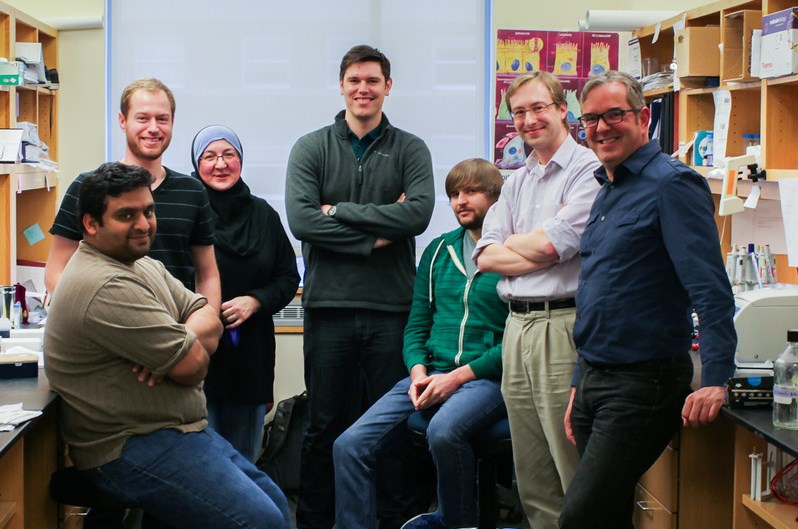van der Vliet Lab Research
Goal:
To address the roles of redox-based mechanisms in lung cell biology and injury, inflammation and remodeling as major features of chronic lung diseases such as asthma, COPD and lung cancer. We also strive to provide a stimulating environment for education and research training in the general area of redox biology and lung pathology.
Our Team

l-r: Karamatullah Danyal, Robert A. Bauer, Aida Habibovic, Andrew Little, Christopher Dustin, David E. Heppner, and Albert van der Vliet
Overview of current research areas
Our research program is at the interface of chemical biology and lung pathology, and is focused on the biological impact of environmental or endogenous oxidants, particularly those generated by NADPH oxidases (NOX) as critical enzymes involved in regulated production of H2O2 and related oxidants, on regulating protein/enzyme function by reversible redox-based post-translational modifications and their associations with lung physiology and pathology. We are primarily interested in addressing these concepts in the context of chronic lung diseases such as allergic asthma, pulmonary fibrosis and lung cancer, with the goal of identifying redox events that are diagnostic of chronic disease, or therapeutic strategies to intervene with these processes. Our research is multidisciplinary in nature, and spans from protein biochemistry, analytical and proteomics approaches to assess oxidative protein modifications, to functional studies with cultured (primary) lungs cells and animal models of lung disease and patient-derived tissue specimens.
Current ongoing projects and interests
- Assess associations between altered NOX enzyme expression and chronic lung disease, and the impact of aging or other co-morbidities such as obesity. These studies are mostly focused on DUOX1, a major NOX isozyme in the respiratory epithelium, and its involvement in:
- Allergic asthma
- Interstitial lung disease
- Lung cancer
- Identify the involvement of NOX enzymes (DUOX1) in redox-based post-translational modifications, and their roles in functional regulation and redox-based signaling
- Chemoproteomic approaches to asses cysteine oxidation
- Biochemical and molecular dynamics to address impact on protein function
- Cell-based studies using genetic approaches (CRISPR) or proximity labeling (e.g. BioID, TurboID)
- Oxidative mechanisms of extracellular matrix (ECM) remodeling
- Oxidative protein cross-linking by secreted peroxidases or other oxidases
- Unique role of peroxidasin (PXDN) in bromide-mediated oxidative ECM modifications
- Assess impact on ECM organization and cell behavior
- Post-translational regulation of NOX/DUOX enzyme function
- Cell-free systems to assess NOX/DUOX enzyme function
- Impact of post-translational cysteine modification
- Importance of enzymatic systems involved in NADPH homeostasis
Ongoing collaborative efforts
Our research team is engaged in long-standing collaborative efforts with various colleagues at Maastricht University (the Netherlands), Tohoku University in Sendai (Japan), and the University of São Paolo (Brazil), providing regular opportunities for international student exchange between these Universities.